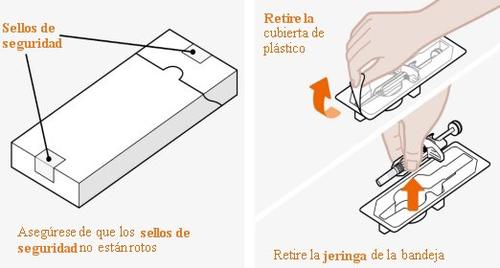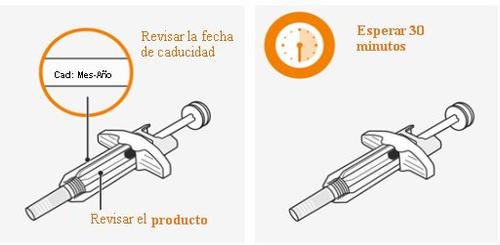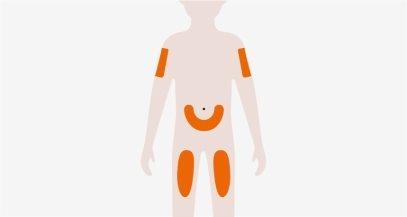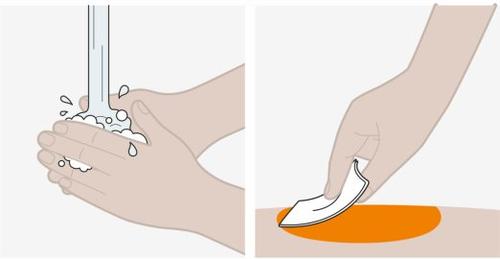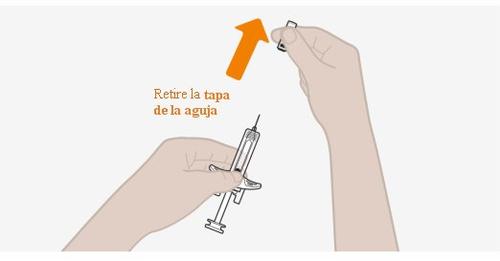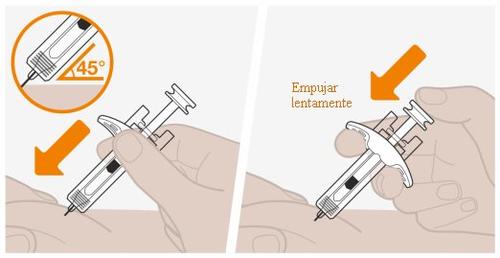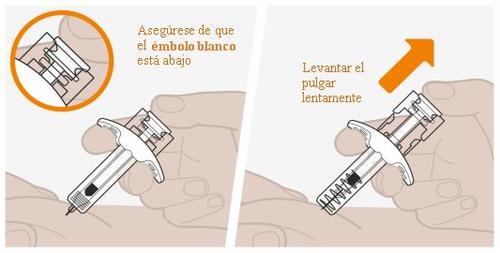
NUCLEO CMP FORTE Injectable
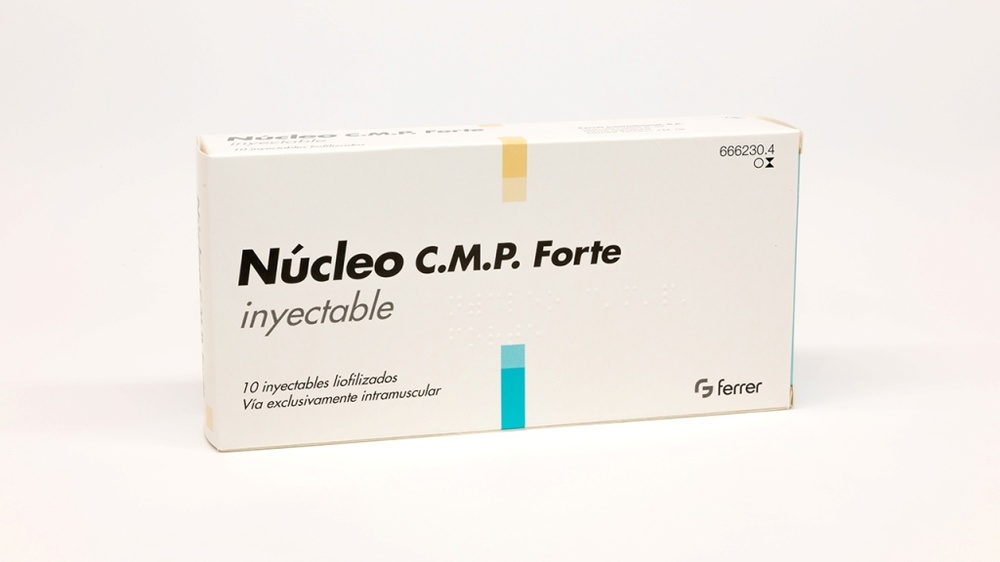

How to use NUCLEO CMP FORTE Injectable
Translated with AI
This page provides general information and does not replace a doctor’s consultation. Always consult a doctor before taking any medication. Seek urgent medical care if symptoms are severe.
Show originalContents of the leaflet
Introduction
Package Leaflet: Information for the Patient
Nucala 40mginjectable solution in pre-filled syringe
mepolizumab
Read all of this leaflet carefully before you start using this medicine because it contains important information for you.
- Keep this leaflet, you may need to read it again.
- If you have any further questions, ask your doctor, pharmacist, or nurse.
- This medicine has been prescribed for the child in your care, and you should not give it to others, even if their symptoms are the same, as it may harm them.
- If the child experiences side effects, consult a doctor, pharmacist, or nurse, even if they are side effects not listed in this leaflet. See section 4.
Contents of the pack
- What Nucala is and what it is used for
- What you need to know before you use Nucala
- How to use Nucala
- Possible side effects
- Storage of Nucala
- Contents of the pack and further information
- Step-by-step instructions for use
1. What Nucala is and what it is used for
Nucala contains the active substance mepolizumab,a monoclonal antibody, a type of protein designed to recognize a specific target substance in the body. It is used to treat severe asthmain adults, adolescents, and children from 6 years of age.
Some people with severe asthma have too many eosinophils(a type of white blood cell) in their blood and lungs. This condition is called eosinophilic asthma– the type of asthma that Nucala can treat.
If the child is already using medicines such as high-dose inhalers, but their asthma is not well-controlled by these medicines, Nucala may reduce the number of asthma attacks. If the child is taking medicines called oral corticosteroids, Nucala may also help reduce the daily dose they need to control their asthma.
Mepolizumab, the active substance of Nucala, blocks a protein called interleukin-5. By blocking the action of this protein, it limits the production of eosinophils by the bone marrow and decreases the number of eosinophils in the blood and lungs.
2. What you need to know before you use Nucala
Do not use Nucala:
- if the child in your care is allergicto mepolizumab or any of the other ingredients of this medicine (listed in section 6).
- Consult your doctorif you think this applies to the child.
Warnings and precautions
Consult your doctor before starting treatment with Nucala.
Asthma worsening
Some people may experience side effects related to asthma, or their asthma may worsen during treatment with Nucala.
- Consult your doctor or nurseif the child's asthma remains uncontrolled or worsens after starting treatment with Nucala.
Allergic reactions and injection site reactions
Medicines of this type (monoclonal antibodies) can cause severe allergic reactions when injected into the body (see section 4, “Possible side effects”).
If the child has ever had a similar reaction to any injection or medicine:
- Consult your doctorbefore administering Nucala.
Parasitic infections
Nucala may weaken the child's resistance to parasitic infections. If they already have a parasitic infection, it should be treated before starting treatment with Nucala. If they live in an area where these infections are common or if they are traveling to such an area:
- Consult your doctorif you think any of these circumstances apply to the child.
Children and adolescents
This medicine is not intended for use in children under 6 years of age.
Other medicines and Nucala
Tell your doctorif the child is taking, has recently taken, or might take any other medicines.
Other asthma medicines
- Once you have started treatment with Nucala, do not suddenly stop givingthe child the medicines they were taking to prevent their asthma. These medicines (especially those called oral corticosteroids) should be stopped gradually, under the direct supervision of their doctor and depending on their response to Nucala.
Pregnancy and breastfeeding
Patients who are pregnant, think they may be pregnant, or plan to become pregnant should consult their doctorbefore using this medicine.
It is not known whether the components of Nucala can pass into breast milk. Patients who are breastfeeding should consult their doctorbefore using Nucala.
Driving and using machines
It is unlikely that the possible side effects of Nucala will affect the child's ability to drive or use machines.
Nucala contains sodium
This medicine contains less than 1 mmol of sodium (23 mg) per 40 mg; i.e., it is essentially “sodium-free”.
3. How to use Nucala
Nucala is given by injection just under the skin (subcutaneous injection).
Your doctor or nurse will decide if you can inject Nucala to the child in your care. If they consider it appropriate, you will receive training to use Nucala correctly.
The recommended dosefor children from 6 to 11 years is 40 mg. It will be given as 1 injection every 4 weeks.
On the other side of the leaflet, you can find the Instructions for use of the pre-filled syringe.
If you use more Nucala than you should
Consult your doctorif you think too much Nucala has been administered.
If you miss a dose of Nucala
You should inject the next dose of Nucala as soon as you remember. If you do not realize you have missed a dose until it is time for the next dose, just inject the next dose as planned. If you are not sure what to do, ask your doctor, pharmacist, or nurse.
If you stop treatment with Nucala
Do not stop giving Nucala injections unless your doctor tells you to. Stopping or interrupting treatment with Nucala may cause the child's asthma symptoms and attacks to return.
If the child's asthma symptoms worsen while they are receiving Nucala injections:
- Tell your doctor.
If you have any further questions on the use of this medicine, ask your doctor, pharmacist, or nurse.
4. Possible side effects
Like all medicines, this medicine can cause side effects, although not everybody gets them. The side effects caused by Nucala are generally mild to moderate, although they can occasionally be severe.
Allergic reactions
Some people may have allergic reactions or reactions of an allergic type. These reactions can be common (may affect up to 1 in 10 people). They usually occur within minutes to hours after the injection, but sometimes the symptoms may start even several days later.
The symptoms may include:
- chest tightness, cough, difficulty breathing
- fainting, dizziness, feeling dizzy (due to a drop in blood pressure)
- swelling of the eyelids, face, lips, tongue, or mouth.
- hives
- rash
- If you think the child is having an allergic reaction, seek medical attention immediately.
If the child has ever had a similar reaction to any injection or medicine:
- Consult your doctorbefore administering Nucala to the child.
Other side effects include:
Very common:may affect more than 1 in 10 people
- headache
Common:may affect up to 1 in 10 people
- chest infection, whose symptoms may include cough and fever (high temperature)
- urinary tract infection (blood in the urine, painful and frequent urination, fever, pain in the lower back)
- upper abdominal pain (stomach pain or discomfort in the upper abdomen)
- fever (high temperature)
- eczema (red itchy patches on the skin)
- injection site reactions (pain, redness, swelling, itching, and burning at the injection site)
- back pain
- arthralgia (joint pain)
- pharyngitis (sore throat)
- nasal congestion (stuffy nose)
Uncommon:may affect up to 1 in 100 people
- herpes zoster (shingles)
Rare:may affect up to 1 in 1,000 people
- severe allergic reactions (anaphylaxis)
- If the child has any of these symptoms, consult a doctor or nurse immediately.
Reporting of side effects
If you experience any side effects, consult a doctor or nurse, even if they are side effects not listed in this leaflet. You can also report side effects directly through the national reporting system listed in Appendix V. By reporting side effects, you can help provide more information on the safety of this medicine.
5. Storage of Nucala
Keep this medicine out of the sight and reach of children.
Do not use this medicine after the expiry date which is stated on the label or carton after EXP. The expiry date is the last day of the month shown.
Store in a refrigerator (between 2°C and 8°C).
Do not freeze.
Keep the pre-filled syringe in the original packaging to protect it from light.
The Nucala pre-filled syringe can be removed from the refrigerator and stored in the outer packaging without opening for up to 7 days at room temperature (below 30°C) and protected from light. Discard if left out of the refrigerator for more than 7 days.
6. Container Contents and Additional Information
Nucala Composition
The active ingredient is mepolizumab.
Each 0.4 ml of the pre-filled syringe contains 40 mg of mepolizumab.
The other components are: sucrose, disodium phosphate heptahydrate, citric acid monohydrate, polysorbate 80, disodium edetate, water for injectable preparations.
Product Appearance and Container Contents
Nucala is presented in a single-use pre-filled syringe as 0.4 ml of a clear to opalescent, colorless to pale brown-yellow solution.
Nucala is available in a pack containing 1 pre-filled syringe, or in a multipack containing 3 x 1 pre-filled syringes.
Marketing Authorization Holder
GlaxoSmithKline Trading Services Limited
12 Riverwalk
Citywest Business Campus
Dublin 24
Ireland
Manufacturer
GlaxoSmithKline Manufacturing S.P.A
Strada Provinciale Asolana, No 90
43056 San Polo di Torrile, Parma
Italy
You can request more information about this medicinal product by contacting the local representative of the Marketing Authorization Holder:
België/Belgique/Belgien GlaxoSmithKline Pharmaceuticals s.a./n.v. Tel: + 32 (0) 10 85 52 00 | Lietuva UAB “BERLIN-CHEMIE MENARINI BALTIC” Tel: + 370 52 691 947 |
| Luxembourg/Luxemburg GlaxoSmithKline Pharmaceuticals s.a./n.v. Belgique/Belgien Tel: + 32 (0) 10 85 52 00 |
Ceská republika GlaxoSmithKline, s.r.o. Tel: + 420 222 001 111 | Magyarország Berlin-Chemie/A. Menarini Kft. Tel.: + 36 23501301 |
Danmark GlaxoSmithKline Pharma A/S Tlf.: + 45 36 35 91 00 | Malta GlaxoSmithKline Trading Services Ltd. Tel: +356 80065004 |
Deutschland GlaxoSmithKline GmbH & Co. KG Tel.: + 49 (0)89 36044 8701 | Nederland GlaxoSmithKline BV Tel: + 31 (0)33 2081100 |
Eesti OÜ Berlin-Chemie Menarini Eesti Tel: + 372 667 5001 | Norge GlaxoSmithKline AS Tlf: + 47 22 70 20 00 |
Ελλάδα GlaxoSmithKline Μονοπρόσωπη A.E.B.E. Τηλ: + 30 210 68 82 100 | Österreich GlaxoSmithKline Pharma GmbH Tel: + 43 (0)1 97075 0 |
España GlaxoSmithKline, S.A. Tel: + 34 900 202 700 | Polska GSK Services Sp. z o.o. Tel.: + 48 (0)22 576 9000 |
France Laboratoire GlaxoSmithKline Tél: + 33 (0)1 39 17 84 44 | Portugal GlaxoSmithKline – Produtos Farmacêuticos, Lda. Tel: + 351 21 412 95 00 |
Hrvatska Berlin-Chemie Menarini Hrvatska d.o.o. Tel: +385 1 4821 361 | România GlaxoSmithKline Trading Services Ltd. Tel: +40 800672524 |
Ireland GlaxoSmithKline (Ireland) Limited Tel: + 353 (0)1 4955000 | Slovenija Berlin-Chemie / A. Menarini Distribution Ljubljana d.o.o. Tel: + 386 (0)1 300 2160 |
Ísland Vistor hf. Sími: + 354 535 7000 | Slovenská republika Berlin-Chemie / A. Menarini Distribution Slovakia s.r.o. Tel: + 421 2 544 30 730 |
Italia GlaxoSmithKline S.p.A. Tel: + 39 (0)45 7741111 | Suomi/Finland GlaxoSmithKline Oy Puh/Tel: + 358 (0)10 30 30 30 |
Κύπρος GlaxoSmithKline Trading Services Ltd. Τηλ: +357 80070017 | Sverige GlaxoSmithKline AB Tel: + 46 (0)8 638 93 00 |
Latvija SIA Berlin-Chemie/Menarini Baltic Tel: + 371 67103210 | United Kingdom (Northern Ireland) GlaxoSmithKline Trading Services Ltd. Tel: + 44 (0)800 221441 |
Date of Last Revision of this Leaflet:
Other Sources of Information
Detailed information on this medicinal product is available on the European Medicines Agency website: https://www.ema.europa.eu
- Step-by-Step Instructions for Using Nucala 40 mg Pre-filled Syringe
Administration once every 4 weeks.
Follow these instructions on how to use the pre-filled syringe. Failure to follow these instructions may affect the proper functioning of the pre-filled syringe. You should also receive training on how to use the pre-filled syringe. Nucala pre-filled syringe is for subcutaneous use only.
How to Store Nucala |
- Keep refrigerated before use.
- Do not freeze.
- Keep the pre-filled syringe in the original packaging to protect it from light.
- Keep out of sight and reach of children.
- If necessary, the pre-filled syringe can be kept at room temperature, below 30 °C, for no more than 7 days, if kept in the original packaging. Carefully discard the syringe if it is left out of the refrigerator for more than 7 days.
- Store below 30 °C.
Before Using Nucala |
The pre-filled syringe should be used only once and then discarded.
- Do notshare your pre-filled syringe with another person.
- Do notshake the syringe.
- Do notuse the syringe if it falls on a hard surface.
- Do notuse the syringe if it appears to be damaged.
- Do notremove the needle cap until just before injection.
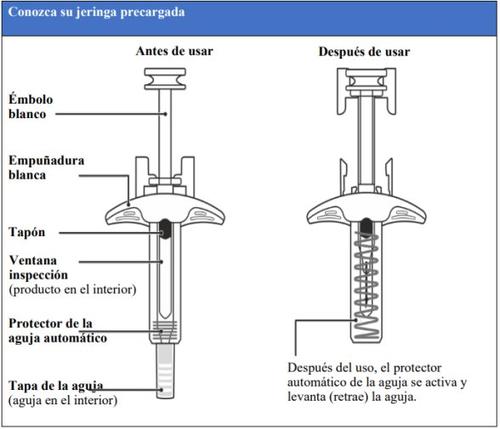
Preparation |
|
Find a comfortable, well-lit, and clean surface. Make sure you have within reach:
|
|
|
Do notuse the syringe if the security seal of the box is broken. Do notremove the needle cap at this time. |
|
|
Do notuse if the expiration date has passed. Do notheat the syringe in the microwave, with hot water, or direct sunlight. Do notinject the solution if it appears cloudy or discolored, or has particles. Do notuse the syringe if it is left out of the packaging for more than 8 hours. Do notremove the needle cap at this time. |
|
|
Do notinject where the skin is bruised, tender, red, or hard. Do notinject within 5 cm of the navel. |
|
|
Do nottouch the injection site again until you have finished. |
Inject |
|
|
Do notlet the needle touch any surface. Do nottouch the needle. Do nottouch the plunger at this stage, as you may accidentally expel the liquid and not receive the full dose. Do notexpel any air bubbles from the syringe. Do notreplace the needle cap on the syringe. This could cause a needle injury. |
|
|
|
|
|
|
Dispose of |
|
|
- Country of registration
- Prescription requiredYes
- Manufacturer
- This information is for reference only and does not constitute medical advice. Always consult a doctor before taking any medication. Oladoctor is not responsible for medical decisions based on this content.
- Alternatives to NUCLEO CMP FORTE InjectableDosage form: ORAL SOLUTION/SUSPENSION, 8.86 mg/mlActive substance: givinostatManufacturer: Italfarmaco S.P.A.Prescription requiredDosage form: ORAL SOLUTION/SUSPENSION, 0.75 mg/mlActive substance: risdiplamManufacturer: Roche Registration GmbhPrescription requiredDosage form: TABLET, 5 mgActive substance: risdiplamManufacturer: Roche Registration GmbhPrescription required
Online doctors for NUCLEO CMP FORTE Injectable
Discuss questions about NUCLEO CMP FORTE Injectable, including use, safety considerations and prescription review, subject to medical assessment and local regulations.
Frequently Asked Questions






